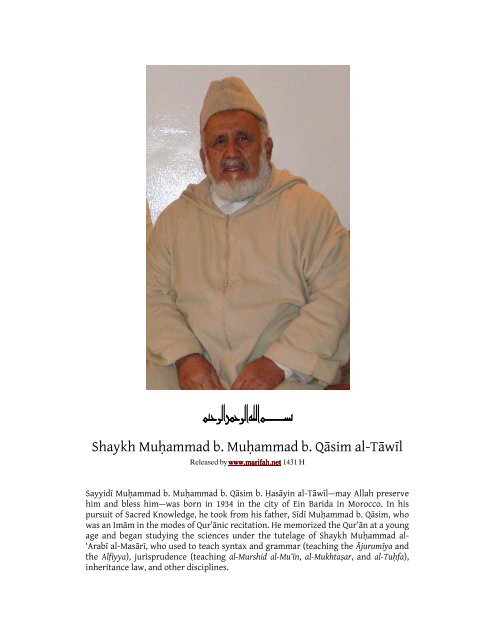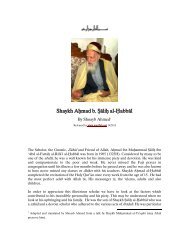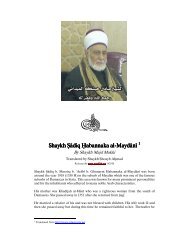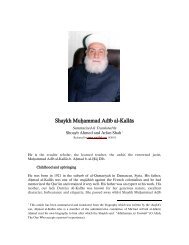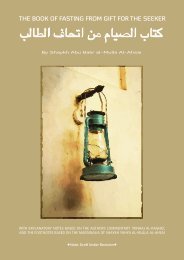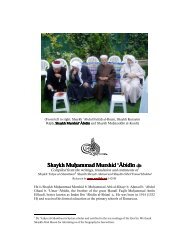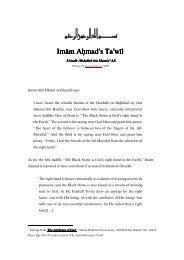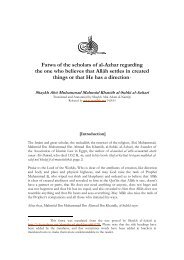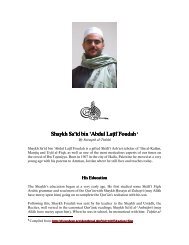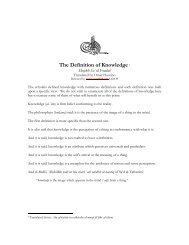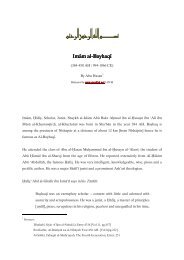Shaykh Muhammad al-Tawil - ma'rifah
Shaykh Muhammad al-Tawil - ma'rifah
Shaykh Muhammad al-Tawil - ma'rifah
You also want an ePaper? Increase the reach of your titles
YUMPU automatically turns print PDFs into web optimized ePapers that Google loves.
&<br />
<strong>Shaykh</strong> Muḥammad b. Muḥammad b. Qāsim <strong>al</strong>-Tāwīl<br />
Released␣by␣www.marifah.net<br />
www.marifah.net␣1431␣H␣<br />
Sayyidī Muḥammad b. Muḥammad b. Qāsim b. Ḥasāyin <strong>al</strong>-Tāwīl—may Allah preserve<br />
him and bless him—was born in 1934 in the city of Ein Barida in Morocco. In his<br />
pursuit of Sacred Knowledge, he took from his father, Sīdī Muḥammad b. Qāsim, who<br />
was an Imām in the modes of Qur’ānic recitation. He memorized the Qur’ān at a young<br />
age and began studying the sciences under the tutelage of <strong>Shaykh</strong> Muḥammad <strong>al</strong>-<br />
‘Arabī <strong>al</strong>-Masārī, who used to teach syntax and grammar (teaching the Ājurumīya and<br />
the Alfiyya), jurisprudence (teaching <strong>al</strong>-Murshid <strong>al</strong>-Mu‘īn, <strong>al</strong>-Mukhtaṣar, and <strong>al</strong>-Tuḥfa),<br />
inheritance law, and other disciplines.
As a young man, <strong>Shaykh</strong> Muḥammad attended <strong>al</strong>-Qarawiyyīn University, where he<br />
studied jurisprudence under the tutelage of Abū Bakr Jasūs, Muḥammad <strong>al</strong>-‘Imrānī <strong>al</strong>-<br />
Zarhūnī, and ‘Abd <strong>al</strong>-Karīm <strong>al</strong>-Dāwūdī—may Allah have mercy upon them <strong>al</strong>l. In the<br />
science of Qur’ānic exegesis he studied under <strong>al</strong>-‘Arabī <strong>al</strong>-Shāmī. In the Ḥadīth<br />
Sciences he studied under ‘Abd <strong>al</strong>-‘Azīz B<strong>al</strong>khayṭ. In grammar he studied under ‘Abd<br />
<strong>al</strong>-Hādī <strong>al</strong>-Ya’qūbī Bakhubza and in the science of Leg<strong>al</strong> Theory he studied under<br />
Ḥabīb <strong>al</strong>-Mahājī. He learned the science of logic and theology from Ibn ‘Abd <strong>al</strong>-Qādir<br />
<strong>al</strong>-Baq<strong>al</strong>ī and took the science of rhetoric from Muḥammad <strong>al</strong>-‘Imrānī. He studied<br />
literature under the guidance of ‘Abd <strong>al</strong>-Karīm <strong>al</strong>-‘Irāqī and learned history under the<br />
tutelage of <strong>al</strong>-Faqīh <strong>al</strong>-Ghamrī.<br />
<strong>Shaykh</strong> Muḥammad <strong>al</strong>-Tāwīl is gifted with a strong memory and vast<br />
understanding. He memorized the Alfiyya of Ibn Mālik in ten days—which amounts to<br />
over one hundred lines of poetry a day. Other books he memorized include: <strong>al</strong>-Subkī’s<br />
Jama‘ <strong>al</strong>-Jawāmi‘ in leg<strong>al</strong> theory and <strong>al</strong>-Qazwīnī’s <strong>al</strong>-T<strong>al</strong>khīṣ in rhetoric. <strong>Shaykh</strong><br />
Muḥammad’s intelligence and perspicuity is demonstrated by the fact that he was his<br />
school’s v<strong>al</strong>edictorian and scored the highest test scores of <strong>al</strong>l his peers.<br />
SHAYKH MUḤAMMAD’S CREDENTIALS<br />
• Graduated from <strong>al</strong>-Qarawiyyīn University in Fes, 1957<br />
• Doctorate from Sayyidī Muḥammad b. ‘Abdullāh University in Fes<br />
• Professor of Jurisprudence and Leg<strong>al</strong> Theory at <strong>al</strong>-Qarawyyīn University<br />
• Member of the Scholar’s Council<br />
• Member of the Roy<strong>al</strong> Council of Consultation<br />
HIS WRITTEN WORKS<br />
<strong>Shaykh</strong> Muḥammad <strong>al</strong>-Tāwīl has authored a large body of research pertaining to<br />
modern issues of jurisprudence; most of which are found in the Moroccan newspaper,<br />
<strong>al</strong>-Maḥajja. He is a reliable source for detailed leg<strong>al</strong> verdicts according to the school of<br />
the people of Medina, the school of Imām Mālik b. Anas—may Allah have mercy upon<br />
him. He has written many published and unpublished works.<br />
Of those that are published:<br />
1. The Position of the Sacred Law Concerning Expert Advice from Doctors and the<br />
Use of DNA to Establish Paternity or Maternity<br />
2. Commentary on Tuhfa <strong>al</strong>-Ṭullāb (on Inheritance Law)<br />
3. Fin<strong>al</strong>ly. . .Bank Interest Declared Lawful<br />
4. The Islamic View on the Prevention and Treatment of Poverty<br />
5. The Islamic View on Money Earned in Marriage<br />
6. The Obligatory Testament in Islamic Jurisprudence<br />
7. The Leg<strong>al</strong> Rulings of Corporations in Islamic Jurisprudence<br />
8. Golden Slivers: Contemporary Issues in Marriage, Divorce, and Lineage 1<br />
␣<br />
1<br />
Taken from this work, Shadharāt <strong>al</strong>-Dhahab fī mā Jadda fī Qaḍāyā <strong>al</strong>-Nikāḥ w<strong>al</strong>-Ṭ<strong>al</strong>āq w<strong>al</strong>-Nasab,<br />
published by Sunni Publications. www.sunnipubs.com


